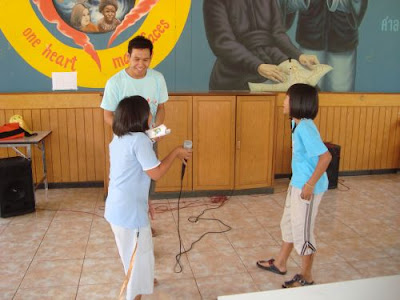A while back a confrere of mine came to Thailand for a visit. This was his first trip to the country. I took him around Bangkok and other places to visit. I tried to inform him about the Thai people and culture as best as I could, and to the best of my understanding after having lived and worked in the country for over two years. Of course, I took him to the temples and the shrines where many Thai people, both Thai and tourists, came to visit or to pray. Later on, I was told that my confrere went back, and in an official meeting of the congregation, made an observation that he felt ashamed when he heard me making the observation that Thai people were superstitious. I of course was not present in this province wide chapter, so I never had the chance to respond to his comment nor could I make any defense as to why I believe my observation was justified.
I am not exactly sure why the term "superstition" has turn into a sort of non-politically correct word in the world of missiology or inter-religious dialogue. I am not a linguist, nor am I a missiologist, even if I am a missionary. For me, certain behaviors are best described as superstition, even if it makes the politically correct people grimace at such a description.
I myself grimaced yesterday when I found out that behind my rectory, there is a banana tree with supernatural powers. A few days ago, two of the AIDS patients in the hospice went around looking for numbers to buy the lottery. They came upon this otherwise ordinary looking banana tree behind my rectory and saw that somehow, someway, the sap from inside the tree had oozed out to form certain numbers on the surface (or what they thought to be shapes of numbers).
The patients decided to select these numbers to buy 200 baht worth of lottery tickets, and lo and behold, they won. The numbers appeared on the outside of the banana tree were apparently correct. As a result, the two men decided to give offerings to this banana tree by tying a ribbon around it. In addition, they brought a chicken and some energy drinks, as well as candles and incense to make offerings to the tree.
I never actually saw the act taking place. Only the following morning, I was informed by one of the youth that this had taken place. I went out to look and of course, I found what was left of the incense and candles left amidst the pile of dry leaves at the bottom of the banana bush.
I was imagining that with this banana tree having special powers to help people win the lottery, the word would go far and wide, and soon people will be coming in droves to look for numbers that the tree has to offer. But so far, no such phenomenon has taken place.
The only thing that has taken place so far is that I have gone to the staff of the AIDS hospice and asked her to tell the patients that I do not approve of this type of offering taking place on the grounds of my church. And after I told Brother Damien, the director of the MPH Center about what happened, he asked me to add the Mother of Perpetual Help Center grounds to the prohibition as well.
So far, the ribbon around the banana tree remains tightly wrapped. I've been looking at the tree occasionally from inside the rectory to see if there's anything unusual about it. But so far, nothing much has happened. The only unusual thing that has occurred is that another tree in the same bush has somehow fallen down behind it. Unfortunately, there are young bananas growing on the fallen tree. I wonder if a blast of wind has caused the fall, or the gardener has decided to cut it down, or this was the result of the overwhelming power coming from the tree that oozed correct lottery numbers.
Nong Bua Lamphu, 7 April 2010


































